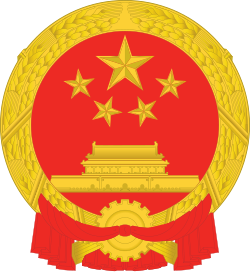Background
Before the enactment of the Law, the Chinese government had already enacted regulations such as the "Regulations on Commendation of Martyrs" and the "Regulations on Pensions and Preferential Treatment for Soldiers". Regarding the original intention of the legislation, the Chinese Communist Party (CCP) believes that some people have distorted China's modern history in the name of "academic freedom", "restoring history" and "exploring details" to vilify, slander, denigrate and question heroes and martyrs. [1] [2] During the 2018 Two Sessions of the National People's Congress and the Chinese People's Political Consultative Conference, 251 NPC deputies, members of the CPPCC National Committee and other people wrote letters to propose that the protection of heroes and martyrs should be strengthened through legislation. [3] In addition, there were incidents of people described as "spiritually Japanese" publicly making remarks that glorify Japanese militarism and denigrating China. Some people openly wore old Japanese military uniforms at the relics of the Second Sino-Japanese War and took photos online, which provoked public criticism. [4] When Chinese foreign minister Wang Yi was leaving the Media Center press conference during the first session of the 13th National People's Congress, he responded to a question from a reporter by saying the "spiritually Japanese" elements are "the scum of the Chinese people". [5] In response, the NPC said it believes it is necessary to enact laws to protect the reputation of martyrs and combat "denial of history". [1]
Legislative history
In March 2016, descendants of the "Five Heroes of Langya Mountain" and other personnel jointly wrote a letter to the National People’s Congress, calling for the early enactment of the "National Heroes and Martyrs Reputation Protection Law" and the addition of corresponding provisions to the current relevant laws. [6] On March 15, 2017, the fifth session of the 12th National People's Congress adopted the General Provisions of the Civil Law of the People's Republic of China, Article 185 of which stipulates that "whoever infringes upon the name, portrait, reputation, honor of heroes and martyrs, etc., or damages the public interest, shall bear civil liability". [7]
In 2017, the Legislative Affairs Commission officially launched legislative work on the protection of heroes and martyrs. [8] [9] In April of the same year, CCP General Secretary Xi Jinping issued instructions on this matter. On December 22, 2017, the 31st session of the 12th NPC Standing Committee reviewed the proposal of the Council of Chairpersons to submit for deliberation the draft law. Xu Anbiao, deputy director of the Legislative Affairs Commission of the NPC Standing Committee, made an explanation to the meeting. [8] [10]
On April 25, 2018, the draft law was submitted to the second session of the 13th National People's Congress Standing Committee for deliberation. The draft proposed to add relevant provisions to crack down on "spiritually Japanese elements". [11] Prior to this, during the 2018 Two Sessions, He Yunao, Zhang Kaili, Zheng Xiaolong, Zhang Guangbei, Feng Yuanzheng, Jackie Chan, Lü Zhangshen, Fan Di'an, Lü Yitao and other 38 members of the CPPCC National Committee from various literary and art circles jointly submitted a proposal on "formulating a special law to protect national dignity and national dignity", which included the behavior of "spiritually Japanese" elements in the scope of criminal punishment. [12] On April 27, 2018, the second session of the 13th National People's Congress Standing Committee passed the law with unanimous votes. [13] President Xi Jinping signed the Presidential Order No. 5 to promulgate this law on the same day. [14] [15] It went into effect on 1 May. [2]
This page is based on this
Wikipedia article Text is available under the
CC BY-SA 4.0 license; additional terms may apply.
Images, videos and audio are available under their respective licenses.

